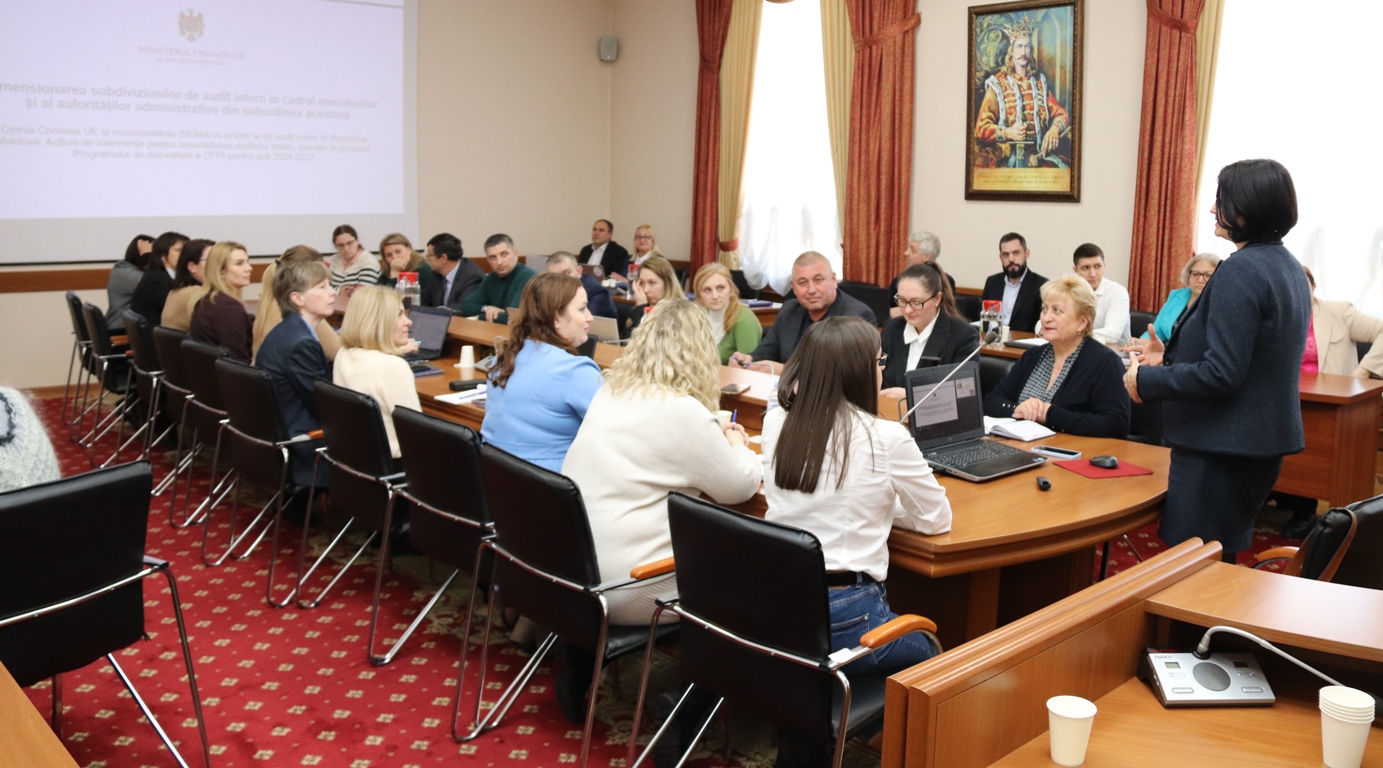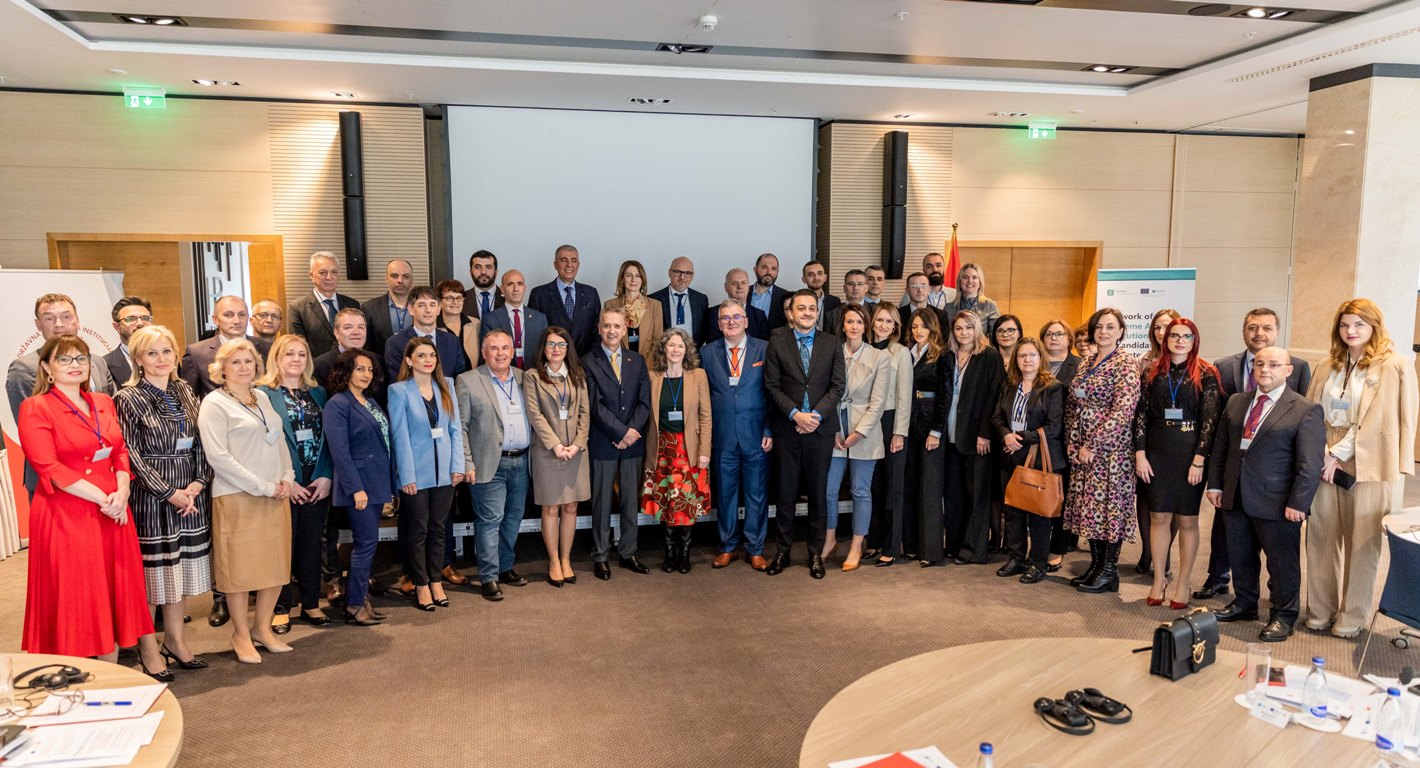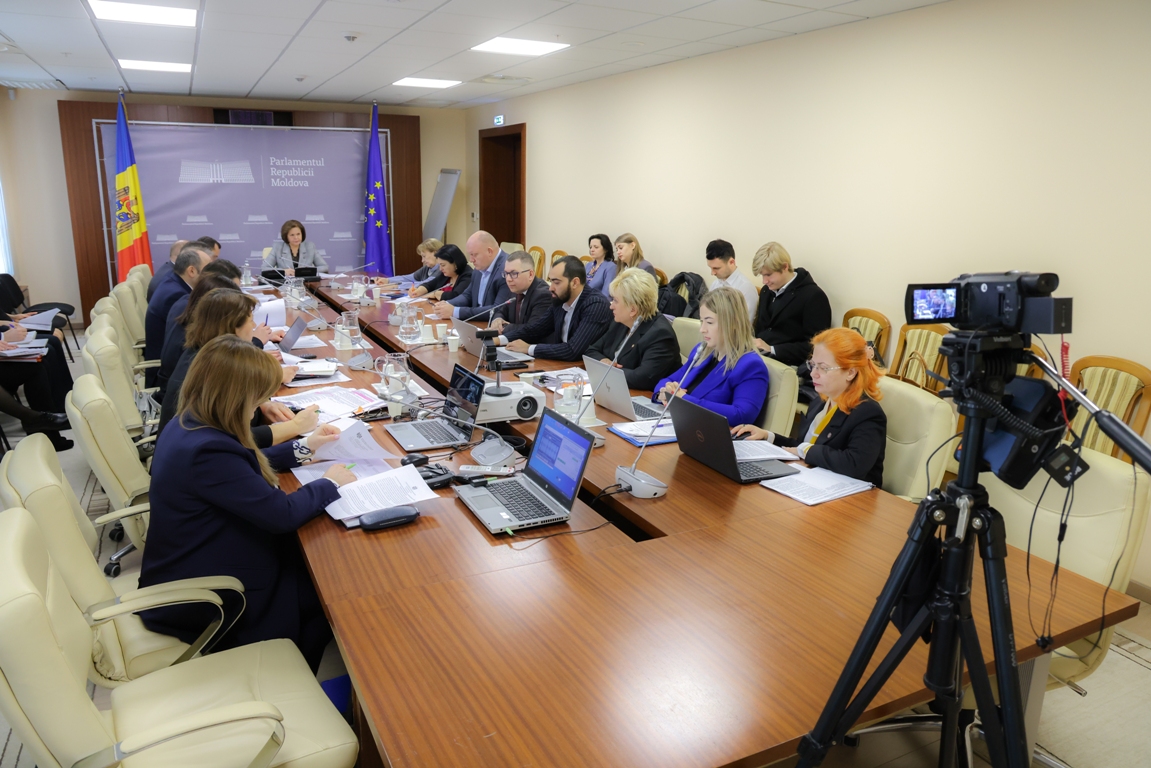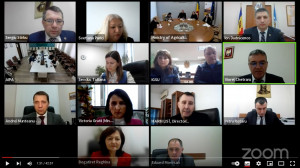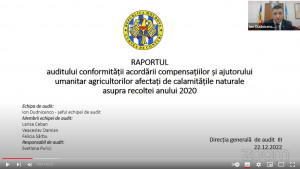.JPG)
The regulatory framework related to natural calamities needs to be revised, and some normative and legislative acts are to be harmonized with each other, recommends the Court of Accounts of the Republic of Moldova (CoARM), in the context of the performed audit.
The compliance audit report on the granting of compensation and humanitarian aid to farmers affected by natural calamities on the 2020 harvest was examined today, December 22, within the public meeting.
The Republic of Moldova is vulnerable to climate changes, and their impact on agriculture is of particular concern, as agriculture is a major source of income for a large part of the population of the Republic of Moldova. More than half of the country's population lives in rural areas and about a third of the workforce works in agriculture. The 2020 agricultural year had a negative impact on the activity of farmers in the country, due to the prolonged pedological drought, which affected both autumn and spring crops.
In order to mitigate the consequences of the natural calamity, direct interventions were carried out, by granting compensation and humanitarian aid to the affected farmers, from three sources of funding totaling 462.8 million lei: by derogation from the legal provisions, 324 million lei were allocated from the means of the National Fund for the Development of Agriculture and the Rural Environment; from the account of the non-refundable financial assistance granted by the Russian Federation, 275 million Russian rubles were allocated, the equivalent of 59.7 million lei; external humanitarian aid – 6 thousand tons of diesel worth 79.1 million lei, granted free of charge by the Government of Romania.
In the process of granting compensations and humanitarian aid to farmers, were involved the Ministry of Agriculture and Food Industry (MAFI), the Agency for Intervention and Payments for Agriculture (AIPA), the Ministry of Finance (MoF), The Ministry of Health, Labor and Social Protection (MHLSP), the Interdepartmental Committee for Humanitarian Aid, as well as the Material Reserves Agency (MRA).
The audit carried out by the CoARM was aimed at determining compliance with the approved regulations for granting compensation and humanitarian aid to farmers affected by the effects of natural disasters on the 2020 harvest.
According to the audit, the limited deadlines for carrying out the tasks delegated to the actors involved in the process of managing the means intended for granting compensations and humanitarian aid generated a series of deficiencies and non-compliances.
Thus, some subsidy files for the granting of compensations and humanitarian aid contain Statement of finding with untrue and undocumented data, which may condition the validation of non-compliant files; the situation is generated by the fact that AIPA does not have tools to verify the correctness of the data in the documents attached to the applicants' files.
AIPA's non-uniform application of the legal provisions regarding the deadlines for the acceptance of files determined the favoring of some beneficiaries, by extending the submission deadline by one day and disfavoring others, the submission deadline being reduced by one day.
The reduced storage capacities in the automated information system "Record of applicants and beneficiaries of subsidies" of the information from the submitted files determined, by way of derogation from the legal provisions, the introduction by AIPA in the AIS of only the information strictly necessary for the validation of the files.
The changes made in some Government’s decisions (G’sD) during their implementation, namely the exclusion of obligations to justify the ownership or use of agricultural land affected by natural calamities, limited AIPA in actions regarding the validation of the land surfaces indicated by the applicants. In this situation, the risk of double granting of financial means persisted, to both owners and managers for the same affected areas.
For the distribution of the support granted to agricultural producers, regulatory provisions were approved by separate G’sD, but the preparation of the Damage Assessment Act was carried out in the absence of a normative act approved in the established manner. The lack of a well-conceived and approved regulatory mechanism led to a series of deficiencies and non-compliances when completing the damage assessment documents, drawn up by the Committees for the examination and evaluation of the degree of damage to agricultural crops, as a result of the recorded natural calamities.
The volume of petroleum products distributed to some agricultural producers was increased compared to the approved ones, as a result of the unilateral application of the average density of diesel fuel used for the transformation from kg to liters, by the distributor, in the absence of coordination of its decisions with MRA. At the same time, is attested the presence of a regulatory void regarding the actions to be taken in the conditions where the beneficiary considered eligible refuses to receive it, has died or is abroad.
Some members of the local Committees for the determination of damages, as well as the decision-makers who approve the Acts for the determination of damages, have admitted to violating the legal regime of conflicts of interest. At the same time, the materialization of the risks regarding the impossibility of repaying the financial means granted non-compliantly is conditioned by the lack of tools to inform the state bodies whose rights could be or have been violated, as a result of the violation of the legal regime of conflicts of interest, including the one-year term regarding the application to the court for the declaration of the nullity of the act and the recovery of the means granted on the basis of this act.
The ambiguous normative-legal framework includes several uncorrelated provisions regarding the declaration of the natural phenomenon "drought", measures will be taken to harmonize the provisions and develop some indicators and thresholds for them, in order to determine the type of drought and its level.
The Court of Accounts concludes that urgent measures are to be undertaken to review, adjust and approve in the established manner the Methodological Guideline regarding the assessment of the degree of damage to agricultural crops due to natural calamities, in order to exclude in the future the application of non-uniform approaches to the preparation of the Damage Assessment Act. Rigorous measures are also needed to recover from the budget the financial means granted irregularly and additionally, and the regulatory framework related to natural calamities needs to be reviewed and harmonized.
The regulatory framework related to natural calamities needs to be revised, and some normative and legislative acts are to be harmonized with each other, recommends the Court of Accounts of the Republic of Moldova (CoARM), in the context of the performed audit.
The compliance audit report on the granting of compensation and humanitarian aid to farmers affected by natural calamities on the 2020 harvest was examined today, December 22, within the public meeting.
The Republic of Moldova is vulnerable to climate changes, and their impact on agriculture is of particular concern, as agriculture is a major source of income for a large part of the population of the Republic of Moldova. More than half of the country's population lives in rural areas and about a third of the workforce works in agriculture. The 2020 agricultural year had a negative impact on the activity of farmers in the country, due to the prolonged pedological drought, which affected both autumn and spring crops.
In order to mitigate the consequences of the natural calamity, direct interventions were carried out, by granting compensation and humanitarian aid to the affected farmers, from three sources of funding totaling 462.8 million lei: by derogation from the legal provisions, 324 million lei were allocated from the means of the National Fund for the Development of Agriculture and the Rural Environment; from the account of the non-refundable financial assistance granted by the Russian Federation, 275 million Russian rubles were allocated, the equivalent of 59.7 million lei; external humanitarian aid – 6 thousand tons of diesel worth 79.1 million lei, granted free of charge by the Government of Romania.
In the process of granting compensations and humanitarian aid to farmers, were involved the Ministry of Agriculture and Food Industry (MAFI), the Agency for Intervention and Payments for Agriculture (AIPA), the Ministry of Finance (MoF), The Ministry of Health, Labor and Social Protection (MHLSP), the Interdepartmental Committee for Humanitarian Aid, as well as the Material Reserves Agency (MRA).
The audit carried out by the CoARM was aimed at determining compliance with the approved regulations for granting compensation and humanitarian aid to farmers affected by the effects of natural disasters on the 2020 harvest.
According to the audit, the limited deadlines for carrying out the tasks delegated to the actors involved in the process of managing the means intended for granting compensations and humanitarian aid generated a series of deficiencies and non-compliances.
Thus, some subsidy files for the granting of compensations and humanitarian aid contain Statement of finding with untrue and undocumented data, which may condition the validation of non-compliant files; the situation is generated by the fact that AIPA does not have tools to verify the correctness of the data in the documents attached to the applicants' files.
AIPA's non-uniform application of the legal provisions regarding the deadlines for the acceptance of files determined the favoring of some beneficiaries, by extending the submission deadline by one day and disfavoring others, the submission deadline being reduced by one day.
The reduced storage capacities in the automated information system "Record of applicants and beneficiaries of subsidies" of the information from the submitted files determined, by way of derogation from the legal provisions, the introduction by AIPA in the AIS of only the information strictly necessary for the validation of the files.
The changes made in some Government’s decisions (G’sD) during their implementation, namely the exclusion of obligations to justify the ownership or use of agricultural land affected by natural calamities, limited AIPA in actions regarding the validation of the land surfaces indicated by the applicants. In this situation, the risk of double granting of financial means persisted, to both owners and managers for the same affected areas.
For the distribution of the support granted to agricultural producers, regulatory provisions were approved by separate G’sD, but the preparation of the Damage Assessment Act was carried out in the absence of a normative act approved in the established manner. The lack of a well-conceived and approved regulatory mechanism led to a series of deficiencies and non-compliances when completing the damage assessment documents, drawn up by the Committees for the examination and evaluation of the degree of damage to agricultural crops, as a result of the recorded natural calamities.
The volume of petroleum products distributed to some agricultural producers was increased compared to the approved ones, as a result of the unilateral application of the average density of diesel fuel used for the transformation from kg to liters, by the distributor, in the absence of coordination of its decisions with MRA. At the same time, is attested the presence of a regulatory void regarding the actions to be taken in the conditions where the beneficiary considered eligible refuses to receive it, has died or is abroad.
Some members of the local Committees for the determination of damages, as well as the decision-makers who approve the Acts for the determination of damages, have admitted to violating the legal regime of conflicts of interest. At the same time, the materialization of the risks regarding the impossibility of repaying the financial means granted non-compliantly is conditioned by the lack of tools to inform the state bodies whose rights could be or have been violated, as a result of the violation of the legal regime of conflicts of interest, including the one-year term regarding the application to the court for the declaration of the nullity of the act and the recovery of the means granted on the basis of this act.
The ambiguous normative-legal framework includes several uncorrelated provisions regarding the declaration of the natural phenomenon "drought", measures will be taken to harmonize the provisions and develop some indicators and thresholds for them, in order to determine the type of drought and its level.
The Court of Accounts concludes that urgent measures are to be undertaken to review, adjust and approve in the established manner the Methodological Guideline regarding the assessment of the degree of damage to agricultural crops due to natural calamities, in order to exclude in the future the application of non-uniform approaches to the preparation of the Damage Assessment Act. Rigorous measures are also needed to recover from the budget the financial means granted irregularly and additionally, and the regulatory framework related to natural calamities needs to be reviewed and harmonized.
 WITH DEFICIENCES OF VIEW
WITH DEFICIENCES OF VIEW Youtube
Youtube Facebook
Facebook


 print
print
